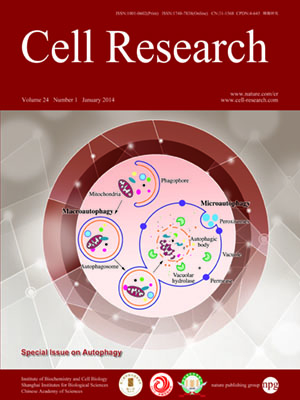
Volume 24, No 1, Jan 2014
ISSN: 1001-0602
EISSN: 1748-7838 2018
impact factor 17.848*
(Clarivate Analytics, 2019)
Volume 24 Issue 1, January 2014: 69-79
REVIEWS
Autophagy and human diseases
Peidu Jiang1,2 and Noboru Mizushima1,2
1Department of Biochemistry and Molecular Biology, Graduate School and Faculty of Medicine, The University of Tokyo, Tokyo 113-0033, Japan
2Department of Physiology and Cell Biology, Tokyo Medical and Dental University, Tokyo 113-8519, Japan
Correspondence: Noboru Mizushima, Tel: +81-3-5841-3440; Fax: +81-3-3815-1490 (nmizu@m.u-tokyo.ac.jp)
Autophagy is a major intracellular degradative process that delivers cytoplasmic materials to the lysosome for degradation. Since the discovery of autophagy-related (Atg) genes in the 1990s, there has been a proliferation of studies on the physiological and pathological roles of autophagy in a variety of autophagy knockout models. However, direct evidence of the connections between ATG gene dysfunction and human diseases has emerged only recently. There are an increasing number of reports showing that mutations in the ATG genes were identified in various human diseases such as neurodegenerative diseases, infectious diseases, and cancers. Here, we review the major advances in identification of mutations or polymorphisms of the ATG genes in human diseases. Current autophagy-modulating compounds in clinical trials are also summarized.
10.1038/cr.2013.161
FULL TEXT | PDF
Browse 1978


